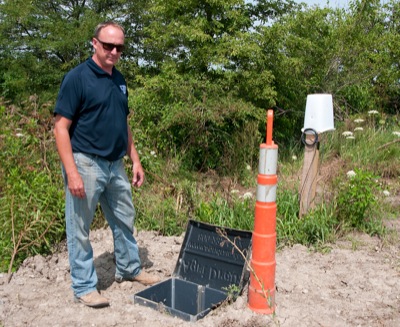Saturday, July 29th, 2017
Change sought in method of state funding
Bill would affect small counties
By William Kincaid
CELNA - State Sen. Matt Huffman, R-Lima, says he plans to introduce legislation this fall that would change the way the state funds a majority of local county governments.
Under Huffman's proposal, the state would cover the election and indigent defense costs of 68 of Ohio's 88 counties in lieu of issuing local government funds to county governments. Municipalities and townships, though, would continue to receive their share of local funds.
"The state has been cutting (local government funds) back and been cutting back the contribution for the indigent defense fund, (which is) ... paying for lawyers for people who can't afford (them)," he told the newspaper this week.
Huffman said the Allen County Commissioners brought the idea to his attention.
"It's about the same amount of money, and we don't have to worry every two years about getting cut," he said about his proposal.
If the funding swap was applied to all counties, the state would stand to lose about $100 million. Thus the legislation, if approved, would only effect the 68 counties with the lowest populations, he said.
"I think in most of my counties, even though some would lose money and some would gain money, essentiality the seven counties are on board with that idea."
Later the same day, Huffman discussed the proposal with Mercer County commissioners Jerry Laffin, Greg Homan and Rick Muhlenkamp.
"I just think that when the state and local governments fight over things like local government funds, the state always wins," Huffman said.
He assured commissioners that municipalities and townships would continue to receive local government funds under his proposal.
The 2016 LGF estimate for all Mercer County entities was $1.077 million, about $18,600 more than received in 2015, but well below the $1.8 million distributed in 2006. The county government itself took 43 percent, which ended up at $453,074.88.
The nine corporations in the county in 2016, including the city of Celina, shared 39 percent of the total, an estimated $420,300. The 14 townships were expected to split approximately $194,000 or 18 percent of the total.
The distribution among the corporations is based on population. However, the formula for splitting the township dollars was changed in recent years to factor in population, property valuations and road miles.
Huffman said his legislation would have the state picking up all county election costs, including housing for the board of elections, election staff compensation and voting machines. Board of elections members - two Republicans and two Democrats - would continue to be appointed by the secretary of state at the recommendation of the each county's two political parties.
In 2016, when six elections were held, an unusually high number, Mercer County ended up spending $350,730 on election-related expenses.
Huffman said his proposal also would standardize county boards of elections, adding that the secretary of state would have the option of selecting one type of voting system for all 88 counties.
Laffin pointed out that county election officials have estimated it would cost $1.5 million to replace the county's electronic voting machines. Most county boards have agreed that systems will need to be replaced before the next presidential election in 2020.
Laffin said spending that kind of money on machines usually used two to three times a year is mind-blowing.
Huffman's legislation also would cover all indigent defense costs, including capital punishment cases, he said. Mercer County doesn't have a public defender's officer. Instead, the court appoints local attorneys to indigent cases, Laffin noted.
"The ability of counties, especially smaller counties, to pay for these capital cases is actually changing jurisprudence," Huffman asserted, explaining that some defense lawyers now hold out for better plea offers, knowing the county can't afford to pursue a death penalty case.
In 2016, the county spent $285,426 on public defenders. The state reimburses the county 40 percent of indigent attorney fees for non-death penalty cases and 50 percent of indigent attorney fees for death penalty cases, county administrative clerk Kim Everman said. However, attorney fees not sent to the state within a 90-day window are denied, often leaving the county at the mercy of appointed attorneys.
Other times, Everman noted, indigent attorney fees are denied because they didn't meet state standards.
Huffman said a state takeover of indigent defense costs would end the the local administrative nightmare of processing and forwarding those indigent attorney fees to the state. The state government, he said, would become responsible for covering all costs.
Huffman said it's imperative that county commissioners get behind the proposal for it to advance through the legislature.

